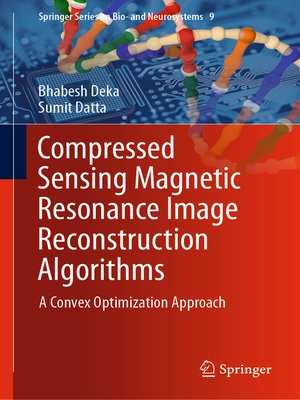Compressed Sensing Magnetic Resonance Image Reconstruction Algorithms
ebook ∣ A Convex Optimization Approach · Springer Series on Bio- and Neurosystems
By Bhabesh Deka

Sign up to save your library
With an OverDrive account, you can save your favorite libraries for at-a-glance information about availability. Find out more about OverDrive accounts.
Find this title in Libby, the library reading app by OverDrive.



Search for a digital library with this title
Title found at these libraries:
| Library Name | Distance |
|---|---|
| Loading... |
This book presents a comprehensive review of the recent developments in fast L1-norm regularization-based compressed sensing (CS) magnetic resonance image reconstruction algorithms. Compressed sensing magnetic resonance imaging (CS-MRI) is able to reduce the scan time of MRI considerably as it is possible to reconstruct MR images from only a few measurements in the k-space; far below the requirements of the Nyquist sampling rate. L1-norm-based regularization problems can be solved efficiently using the state-of-the-art convex optimization techniques, which in general outperform the greedy techniques in terms of quality of reconstructions. Recently, fast convex optimization based reconstruction algorithms have been developed which are also able to achieve the benchmarks for the use of CS-MRI in clinical practice. This book enables graduate students, researchers, and medical practitioners working in the field of medical image processing, particularly in MRI to understand the need forthe CS in MRI, and thereby how it could revolutionize the soft tissue imaging to benefit healthcare technology without making major changes in the existing scanner hardware. It would be particularly useful for researchers who have just entered into the exciting field of CS-MRI and would like to quickly go through the developments to date without diving into the detailed mathematical analysis. Finally, it also discusses recent trends and future research directions for implementation of CS-MRI in clinical practice, particularly in Bio- and Neuro-informatics applications.







